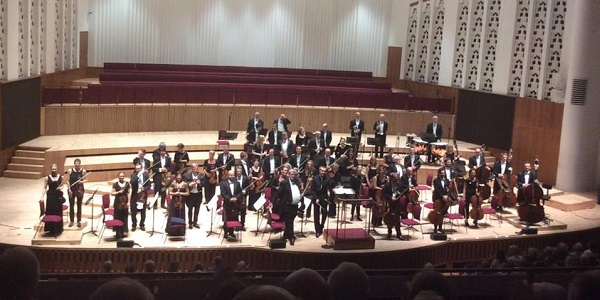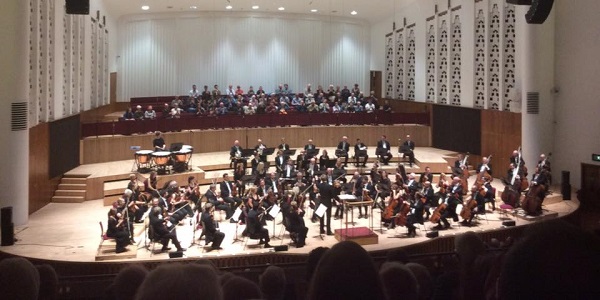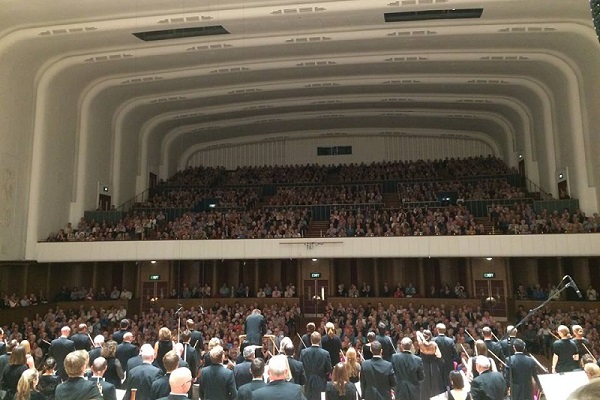 We began with the first three symphonies on 15 September. Petrenko really threw the gauntlet down to his musicians asking them to realise his view of those three works one after the other.
We began with the first three symphonies on 15 September. Petrenko really threw the gauntlet down to his musicians asking them to realise his view of those three works one after the other.
I've been keyed up to attend the RLPO's Beethoven cycle since I first saw it announced and even more so since I bought my tickets a couple of months ago.
It was a sadness to note that summer was more or less done but I was eager to engage with the music.
 We began with the first three symphonies on 15 September. Petrenko really threw the gauntlet down to his musicians asking them to realise his view of those three works one after the other.
We began with the first three symphonies on 15 September. Petrenko really threw the gauntlet down to his musicians asking them to realise his view of those three works one after the other.
They were given numerically rather than chronologically (there's a whole thing that the second published symphony was the first to be written). Nevertheless, the contrast between Nos1 and 2 and No3 was mind blowing.
Yes, already, in the first two there were stirrings of something different to come but they are essentially classically-oriented if experimental in their form. They were given with a chamber sized orchestra and benefited from the space that was given to the sound of the inner parts.
And then, with a somewhat larger ensemble, the Eroica just blew everything apart.
The performance was utterly tremendous. Impassioned. Raucous. Seductive. Energising. Thrilling. The funeral march nearly brought me to tears.
But I loved the way that Petrenko made the music dance with joy during the final movement - the legacy of the revolution will be energy, passion and a damn good party. As I said to Nigel, you don't get that amount of exuberance in a piece of European music again until Messiaen's Turangalîla Symphony.
 Two days later, we were all back with a palpable sense of excitement in the bar areas and the staircases and in the hall itself. The audience knew that it was in for something special.
Two days later, we were all back with a palpable sense of excitement in the bar areas and the staircases and in the hall itself. The audience knew that it was in for something special.
We were there for Symphonies No4 and 5 each preceded by a Berlioz overture.
To be honest, I am not sure why Vassily chose to feed the Berlioz into these concerts. I think that there is a point to be made about the revolutionary aspects of both composers as well as Beethoven's initial admiration for Napoleon Bonaparte and Berlioz's keen Napoleoniste sentiments.
However, a couple of overtures and a song cycle was not enough to make any sort of contrast or comparison really.
I like Symphony No4 and this was a most enjoyable performance with beautiful melodies sung by the strings rather than simply played but then we had Symphony No5 and the roof came off.
Blazing.
And as with the Eroica, there was a sense of energy and fiesta and dance and radiance and joy and a thorough delight with the world and all it has to offer.
And all we could do at the end was to roar our approval.
 By the 22nd, when the audience reassembled, the chatter was extraordinarily loud. People who had never met before found themselves sitting among familiar, kindred spirits and were marvelling at their immense luck to be part of a shared experience of something very special. They also knew that this particular evening would be the biggest challenge of them all. Symphonies 6, 7 and 8. Some of the most well known music in the entire repertoire.
By the 22nd, when the audience reassembled, the chatter was extraordinarily loud. People who had never met before found themselves sitting among familiar, kindred spirits and were marvelling at their immense luck to be part of a shared experience of something very special. They also knew that this particular evening would be the biggest challenge of them all. Symphonies 6, 7 and 8. Some of the most well known music in the entire repertoire.
But the experience was anything but mundane.
The Pastoral was an absolute joy. Yes, it was a walk in the countryside but it wasn't a delicate water-colour depiction of an idealised landscape. This was earthy and raucous. It danced and sang and spoke of good things despite the storms that came along.
And then the Seventh.
I had never really understood previously why Wagner described Beethoven's Seventh as "the apotheosis of dance". Yes, Karajan is rampant in the final movement and there are plenty of opportunities for energetic expression but just listen to Karl Böhm's account of the second movement Allegretto - it's like Farmer Giles plodding through a muddy field.
Well, by the end of this performance, the auditorium was littered with socks that had been blown off. The best that I could manage in the bar was "Fuck me, that was astonishing". Roland was shell-shocked and breathless. Nigel was devastated. Our only concern was for the band and how they would find the stamina to come back on stage for Symphony No8.
But they did and, again, it was another big wow. The standard of playing was magnificent and Petrenko 's interpretation continued his view of the works being about sublime energy rather than grinding struggle. It was already a revelation to see that view of dance and joy and energy and song play out through the cycle in such a short space of time. And there was still the Ninth to come.
 And I would think that every single person arriving at the Philharmonic Hall on the 25th carried with them enormously high expectations. Berlioz's Les nuits d'étes was not what we were there for but we were polite and clapped it through.
And I would think that every single person arriving at the Philharmonic Hall on the 25th carried with them enormously high expectations. Berlioz's Les nuits d'étes was not what we were there for but we were polite and clapped it through.
And then we all went out for our interval drink and didn't dare to ask for anything too fabulous from the second half before settling back down in our seats and crossing our fingers.
Some seventy minutes later, we rose as one to cheer and stamp and clap our approval for a performance that had absolutely been an Ode to Joy. The performance had been a rousing conclusion to a superbly achieved cycle. Rapturous and jubilant. A fitting end to a superlative series of concerts.
Roland invited me to repair with him to the Crush Bar afterwards for a reception at which the free wine flowed freely.

Even without the wine, the mood was rapturous, buoyant, confident, self-assured. These days in Liverpool, we know that we can be proud of our classical music makers.
 Two days later, I was in the Concert Hall at St George's Hall to hear the first of two concerts where James Ehnes would perform Bach's sonatas and partitas for solo violin.
Two days later, I was in the Concert Hall at St George's Hall to hear the first of two concerts where James Ehnes would perform Bach's sonatas and partitas for solo violin.
The leap from full orchestra and choir to solo violin in such a short space of time was amazing. It was simply just a completely different sort of focus - from wide-angled spectacle to intimate close-up.
And it was amazing to witness one human conjure such a variety of intricately beautiful sound patterns from such an essentially limited instrument.